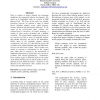Free Online Productivity Tools
i2Speak
i2Symbol
i2OCR
iTex2Img
iWeb2Print
iWeb2Shot
i2Type
iPdf2Split
iPdf2Merge
i2Bopomofo
i2Arabic
i2Style
i2Image
i2PDF
iLatex2Rtf
Sci2ools
METRICS
1999
IEEE
1999
IEEE
Re-Planning for a Successful Project Schedule
Time to market or project duration has increasing significance for commercial software development. We report on a longitudinal study of a project at IBM Hursley Park. The focus of this study was schedule behaviour, however, we explored a range of related factors including planned versus actual progress, resource allocation and functionality delivered. In the course of the twelve-month study, evidence was collected from 8 interviews, 49 project meetings, a number of other project documents and a feedback workshop. The project leader considered the project to be a success, not only in terms of satisfying resource and schedule objectives, but also in the marketplace. Whilst many of the originally planned external commitments were met, it is clear that the project did not adhere to its original (detailed) plan and indeed there were no less than seven re-plans. These re-plans were mainly in response to misestimates in the original
Related Content
| Added | 04 Aug 2010 |
| Updated | 04 Aug 2010 |
| Type | Conference |
| Year | 1999 |
| Where | METRICS |
| Authors | Austen Rainer, Martin J. Shepperd |
Comments (0)

